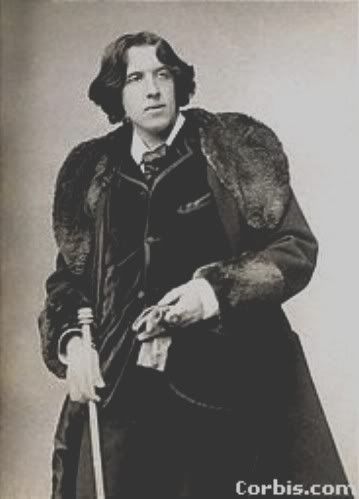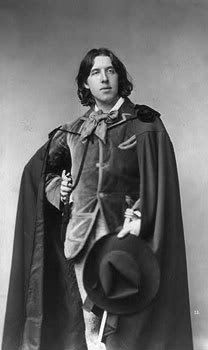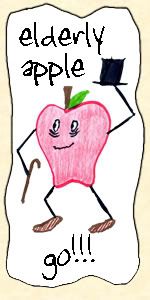The first person we shall examine is a certain Mr. Oscar Wilde. You may remember him as the author of such works as The Picture of Dorian Gray, The Importance of Being Earnest, and others.
Despite my enjoyment of his works, they are not the part of him that influences me. In fact, it may not even be the man himself. It is the very idea of him. Look at the following pictures of him:


 To me, his looks alone are the epitome of cool. And I’m not the only one who thinks so. But the part about him that really appeals to me is his intelligence with the English language. The ability to turn a phrase when needed. The ability to be witty on cue. To have quotes aplenty!
To me, his looks alone are the epitome of cool. And I’m not the only one who thinks so. But the part about him that really appeals to me is his intelligence with the English language. The ability to turn a phrase when needed. The ability to be witty on cue. To have quotes aplenty!
I am a fan of quotes (more about this another day). I even have my own last words figured out. But Oscar Wilde is a veritable cornucopia of quotes. Consider the following:
“To love oneself is the beginning of a lifelong romance.”
“I have nothing to declare but my genius.”
“A man's face is his autobiography. A woman's face is her work of fiction.”
“I can resist everything except temptation.”
And finally, the mantra I live by:
“Life is far too important to be taken seriously.”
The list goes on and on. To me, witty quotes are the best kind of comedy there is. Terse, funny, and occasionally insightful.
In addition to a love of quotes, I also am fond of Mr. Wilde’s time period. If I had to choose an olden decade to live in, it would definitely be the 1890s. It doesn’t even matter where, both the
I guess you say for comparison’s sake that like a bee craves pollen, I crave the 1890s.
I must admit, Mr. Wilde isn’t the only tangible factor in my love of the period. There was a Wikipedia article about “S. A. Andrée's Arctic balloon expedition of 1897” that was featured over a year ago. It seemed like such an unusual topic that I had to read it. In the article (which is one of the few long articles I’ve read in its entirety; it’s that interesting). I saw the following picture:
The first thing that popped into my mind: “Wow, those are three of the coolest dudes I’ve ever seen!”
That previous line is neither joke nor hyperbole. I even used this picture of Nils Gustaf Ekholm (who looks suspiciously like Jamie Hyneman from Mythbusters) as my desktop picture for awhile (and writing this has influenced me to use it again).
Unlike Dimas, I have no desire to be a gap-toothed hillbilly in the future. No, my image of the ideal Andrew Schnorr (or at least, one of them) is in a smart three-piece suit, a top hat resting upon my head, and an unnecessary monocle occasionally covering my left eye. A silk cloak would hug my shoulders like a good friend. In my hand is a polished hickory walking stick with a silver, spherical top, perfect for grasping and for bludgeoning. (I always say, using a walking stick is awesome unless you actually need to use it.) A witty socialite in the upper crust of society, I would be invited to luncheons for every occasion under the sun. While gently tapping a spoonful of caviar onto a triangle of bread, I would say to the local manufacturer, “Overworking the machines? Charles, as long as they don’t ask for wages, they can work as long as you please.” The gentle laughter in the background would be my ambrosia.
I’d also like a rival. Every person worth his grain of salt in the 1890s had a rival with whom they could trade verbal barbs with, while their audience laughs at the treat they’re receiving. I imagine my rival as being a gruff scientist-professor type, a few years my elder. Quite serious about his work, but still relatively friendly. I would be the frivolous, happy-go-lucky writer always pestering him. Yes, the writer-scientist rivalry has been a staple of society since time immemorial.
I’d like to give you a couple examples of the kinds of conversations I’d think Professor Attenborough (as I’ve come to call him) and I would have. For your listening pleasure, I’ve included some recordings of these very same conversations so you can listen as your read. While they’re not entirely professionally edited (there’s a few popped P’s in there), I added Vivaldi’s Spring Concerto for effect, it being the official music of high society.
This first scenario takes places when Prof. Attenborough is trying to give a presentation on his newest discovery (on what, I have no idea). I, being the incorrigible scamp that I am, walk in during the middle of it, loudly moving my way through the crowd to find a seat. Banter ensues. Click here to listen. (Imagine there's gentle laughter in the background.) And here’s the transcript:
Attenborough: My good Mr. Schnorr, I’ll thank NOT to intrude upon my presentation!
Me: Well, no need to thank me, then.
Attenborough: And exactly why did you see fit to come here this afternoon?
Me: Well, you see, I was simply trying to understand why you have never listened to any of my counterpoints to argument?
Attenborough: Well, you see, Mr. Schnorr, I have a most peculiar condition of the ear which only allows me to hear the voices of those who have something worthwhile to say.
Me: Heh. If that’s the case, it’s a wonder you can scarce hear anything at all above the tumult which must be my voice ringing in your ears.
Attenborough: Hoh! Your wit will only get you so far, Mr. Schnorr.
Me: If it gets me where I need to go, what more do I ask?
Attenborough: Mmm…please sit down, Mr. Schnorr.
Me: Of course, I would never wish to disturb your…*ahem*…enlightening lecture.
The second scene takes place after the presentation is over and done with. Prof. Attenborough is walking away with his materials, and I am hustling to catch up with him. Listen to the shenanigans here, and read the transcript:
Me: Well, Professor, I must say, I previously underestimated your capacity for experimentation. Why, sitting through that lecture was a true test of human willpower.
Attenborough: Mr. Schnorr, why do you insist on continuing this harassment of me?
Me: Harassment? Ha! Everyone enjoys my company, yourself included. In fact, I’m willing to offer more of it, if you’ll join me in a drink.
Attenborough: A drink? Hoh, Mr. Schnorr, I can see right through your chicanery. You plan to get me inebriated so that I go out and make a fool of myself in public.
Me: Well, I hardly need you inebriated to accomplish that. But no, I was considering a more benign drink, more along the lines of tea.
Attenborough: Tea? Benign? Hoh! There is nothing about that caffeinated concoction. Why, you see, tea is an inflamer of the senses of the senses and an inflamer of the tongue. It makes men speak hastily and in that haste they say nothing but foolish babble.
Me: Calm down, Professor. You make it sound so nefarious.
Attenborough: Anything offered by a nefarious person like yourself, Mr. Schnorr, is in its very nature nefarious.
Me: So I see. And, what if I were to ask you specifically not to join me in my afternoon tea?
Attenborough: Well, then, I would be forced to go, if only to show you that you do not have the power to tell me what to do.
Me: Well, then, I insist you do not come to tea with me this afternoon!
Attenborough: Then I shall be there! And we will both be unhappy!
Both: *Laughter.*
See, despite our constant digs at each other, we remain on friendly terms. What a great relationship!
The influence continues into some of my story ideas. For example, I have an idea for a screenplay which is about bounty hunters in the future. But the thing is, they’re all very dignified and witty. I guess you could say it’s a mix of Blade Runner and The Importance of Being Earnest. In fact, one of the characters actually dresses in a tweed suit, has a silver-capped walking stick, and acts in a manner similar to my time-shifter doppelganger. The character’s name? Oscar, of course!
To be perfectly honest, I probably wouldn’t be happy in the 1890s. No computers, no good transportation, questionable methods of bathing. That is why I specifically avoid saying, “I’d like to live in the 19th Century.” The most accurate way of putting it would be, “I’d like to live in the current century, while daydreaming about the 19th Century.” And wouldn’t you know, that’s what I do!
As for how I write, I wouldn’t say that I exactly “plagiarize” the style of Oscar Wilde and his kin. However, he and his time period have inspired the way I think, which indirectly translates to an influence in my writing. Perhaps there are shades in there I can’t even see.
If nothing else, though: “Life is far too important to be taken seriously.”
Thanks for the advice, Oscar!




No comments:
Post a Comment